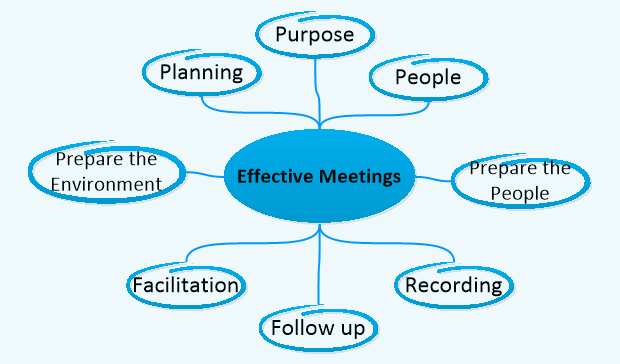Share this
STOP! Read this before you suffer another unproductive business meeting
by Jasmin Wilkins on 12 January 2016

Don’t you love it when you attend a business meeting that starts energetically and on time, the attendees are really present and actively discussing the agenda, resulting in clear decisions or action points? After a meeting like that, I walk out enthused, knowing work has been done well.
Reality check! How many meetings do we attend that really are as productive as this? Sadly, too often it’s more like the experience my colleague had last week – two hours on an audio-conference not quite sure what was being discussed and why (or by whom!) and not quite sure what the follow up was (other than there were no action points for her!).
Business change and IT activities involve people – people who have important experiences and information to contribute, people who need to coordinate and collaborate to deliver change, and people who are impacted by the change. Meetings are essential to delivering successful business change and IT projects.
This article is a call to action – make your business meetings better, more productive and more valuable, starting NOW. You owe it to yourself, your colleagues and your organisations to use meeting time productively. In this article I provide a set of meeting guidelines that will make your meetings significantly more effective.
While I am writing in the context of business change and IT meetings, the guidelines apply to any type of meeting.
1. Identify the purpose
Good meetings have a purpose. No purpose – No meeting!
- Purpose: What is the expected outcome from this meeting?
- Process: How will the outcome be achieved?
- Timing: How long will it take to complete the process?
2. Prepare an agenda
Achieving an outcome requires a plan. Prepare an agenda designed to achieve the outcome, clearly describing the work items and timing.
- Agenda: What activities will take place at the meeting?
- Background: What preparation is required for participants?
- Location: Where will the meeting be held - online, audio, physical, video?
3. Identify the right attendees
Good meetings need just the right attendees. Everyone attending needs to be able to contribute to the outcome. No role – No reason to attend!
Common roles which may be required include: Lead, Facilitator, Recorder, Expert, Decision maker, Presenter and Observer.
For example, in a requirements review meeting, I might invite Tom, Annie, and John as subject matter experts to provide feedback; Jessie as the business owner and decision maker; Tina to facilitate; and Adrian to take minutes.
4. Invite the attendees and ask them to prepare
Great – you have a purpose, a plan to achieve it, and you know who needs to be there! It’s time to get everyone on board!
Make sure everyone is free to attend the meeting, invite them, including the agenda and supporting information. Encourage feedback and discussion – good meetings deliver value for everyone attending, not just the organiser!
Ask your attendees to prepare for the meeting, providing specific actions. This will make the time during the meeting much more productive.
Make sure you share the purpose, attendee roles, and agenda with all the attendees in advance. For a simple meeting this may a quick email: ‘Team – block out 10.30-11.00 tomorrow to review the test results from last week. We’ll review the 6 test failures (details in the attached report p 8-10). Please make sure you’ve read the test results before we meet, we need everyone’s ideas on options to resolve the issues’.
For a two day strategy workshop, a more formal invitation and agenda is likely to be required.
5. Prepare the right environment
A meeting in a space in which everyone can participate effectively is more likely to be successful. A meeting in a small poorly lit room without enough chairs or table space, or an audio conference with people dialling in while walking outside, is less likely to achieve the meeting purpose.
- Venue: What kind of facilities are required for the meeting activities?
- Resources: What resources are required? e.g. presentation screen, poster paper, markers, sticky notes, video-conference unit
- Records: How will the meeting activities and outcomes be recorded?
- Refreshments: What refreshments are needed? Hanger (hungry anger) can easily derail a meeting, try and have snacks or sweets available if the meeting is longer than an hour!
If you’re using an unfamiliar resource (e.g. meeting room, video conference facility) … check these it out beforehand! I once booked a meeting room that was listed as holding 40-60 people and having presentation equipment. I turned up early to discover I’d booked only half of that room. The half without the equipment! That was a busy fifteen minutes!
On the day, get in a little early, set up your resources and any refreshments. Make the agenda visible at all times to the participants.
6. Proactively facilitate the business meeting
Good meetings are well facilitated and directed to achieve the purpose of the meeting.
Everyone has finally turned up – so let’s just start huh? Maybe not! Take a couple of minutes to set the scene will help create a productive meeting.
- Start on time!
- Welcome everyone
- Briefly state the background and purpose of the meeting
- (Optional) Review meeting etiquette – e.g. devices away, how to share the floor when multiple locations are involved
- Invite everyone to briefly introduce themselves (after people have spoken once in a meeting, they are more likely to contribute)
- Check all attendees have the meeting information, and have reviewed it. If some haven't reviewed it, consider for a little time for silent review, or reschedule.
- Check the agenda still fits the purpose
- Start on the agreed agenda
- Record all decisions, action points, and key discussion items. If possible, somewhere visible to all, such as the whiteboard. Any errors will then be noticed!
- Confirm action points, due dates, and owners
- Thank everyone for their time and effort
- Close on time (or early!).
7. Send out the meeting minutes
Good meetings result in agreed, documented outcomes, decisions and actions.
Send the minutes out as soon as you can! There are a few ways you can make this easier. My favourite is to ensure I record everything on a whiteboard or poster in the meeting, photograph it (using the CamScanner app to clean and straighten the image) and distribute the images as the minutes for the meeting. I insert them into a document with supplementary notes on key decisions and assigned actions.
8. Track the assigned actions
Good meeting outcomes depend on people completing their follow-up activities.
People often have more work coming in, and it's easy for actions to drop in priority - keep them front of mind and make sure actions are tracked through to completion.
Act now to avoid unproductive business meetings!
Running and participating in effective meetings is part of being a capable IT and business professional.
If you are running a meeting – try the steps outlined above, and see the difference!
If you are attending a meeting, check you have the answers to these three questions:
- What is the purpose of this meeting?
- What is my role at this meeting?
- What will we be doing at this meeting?
Try this approach for your business meetings, and add a dash of humour; people will enjoy them more, you’ll deliver better results, and you’ll walk out enthused, knowing work has been done well!
 Let us know how you get on and if you have any other great meeting tips – please share!
Let us know how you get on and if you have any other great meeting tips – please share!
Jasmin Wilkins is a Principal Consultant, specialising in business analysis, business architecture and business change, based in Equinox IT’s Wellington office.
Share this
- Agile Development (84)
- Software Development (66)
- Scrum (39)
- Business Analysis (28)
- Agile (27)
- Application Lifecycle Management (26)
- Capability Development (20)
- Requirements (20)
- Solution Architecture (19)
- Lean Software Development (17)
- Digital Disruption (16)
- IT Project (15)
- Project Management (15)
- Coaching (14)
- DevOps (14)
- Equinox IT News (12)
- IT Professional (11)
- Knowledge Sharing (10)
- Strategic Planning (10)
- Agile Transformation (9)
- Digital Transformation (9)
- IT Governance (9)
- International Leaders (9)
- People (9)
- IT Consulting (8)
- AI (7)
- Cloud (7)
- MIT Sloan CISR (7)
- ✨ (7)
- Change Management (6)
- Azure DevOps (5)
- Innovation (5)
- Working from Home (5)
- Business Architecture (4)
- Continuous Integration (4)
- Enterprise Analysis (4)
- FinOps (4)
- Client Briefing Events (3)
- Cloud Value Optimisation (3)
- GitHub (3)
- IT Services (3)
- .Net Core (2)
- Business Rules (2)
- Data Visualisation (2)
- Java Development (2)
- Security (2)
- System Performance (2)
- API (1)
- Automation (1)
- Communities of Practice (1)
- Kanban (1)
- Lean Startup (1)
- Microsoft Azure (1)
- Satir Change Model (1)
- Testing (1)
- January 2026 (2)
- November 2025 (1)
- August 2025 (3)
- July 2025 (3)
- March 2025 (1)
- December 2024 (1)
- August 2024 (1)
- February 2024 (3)
- January 2024 (1)
- September 2023 (2)
- July 2023 (3)
- August 2022 (4)
- July 2021 (1)
- March 2021 (1)
- February 2021 (1)
- November 2020 (2)
- July 2020 (1)
- June 2020 (2)
- May 2020 (2)
- March 2020 (3)
- August 2019 (1)
- July 2019 (2)
- June 2019 (1)
- April 2019 (2)
- October 2018 (1)
- August 2018 (1)
- July 2018 (1)
- April 2018 (2)
- January 2018 (1)
- September 2017 (1)
- July 2017 (1)
- February 2017 (1)
- January 2017 (1)
- October 2016 (2)
- September 2016 (1)
- August 2016 (4)
- July 2016 (3)
- June 2016 (3)
- May 2016 (4)
- April 2016 (5)
- March 2016 (1)
- February 2016 (1)
- January 2016 (1)
- December 2015 (5)
- November 2015 (11)
- October 2015 (3)
- September 2015 (1)
- August 2015 (1)
- July 2015 (7)
- June 2015 (7)
- April 2015 (1)
- March 2015 (2)
- February 2015 (2)
- December 2014 (3)
- September 2014 (2)
- July 2014 (1)
- June 2014 (2)
- May 2014 (8)
- April 2014 (1)
- March 2014 (2)
- February 2014 (2)
- November 2013 (1)
- October 2013 (2)
- September 2013 (2)
- August 2013 (2)
- May 2013 (1)
- April 2013 (3)
- March 2013 (2)
- February 2013 (1)
- January 2013 (1)
- November 2012 (1)
- October 2012 (1)
- September 2012 (1)
- July 2012 (2)
- June 2012 (1)
- May 2012 (1)
- November 2011 (2)
- August 2011 (2)
- July 2011 (3)
- June 2011 (4)
- April 2011 (2)
- February 2011 (1)
- January 2011 (2)
- December 2010 (1)
- November 2010 (1)
- October 2010 (1)
- February 2010 (1)
- July 2009 (1)
- October 2008 (1)